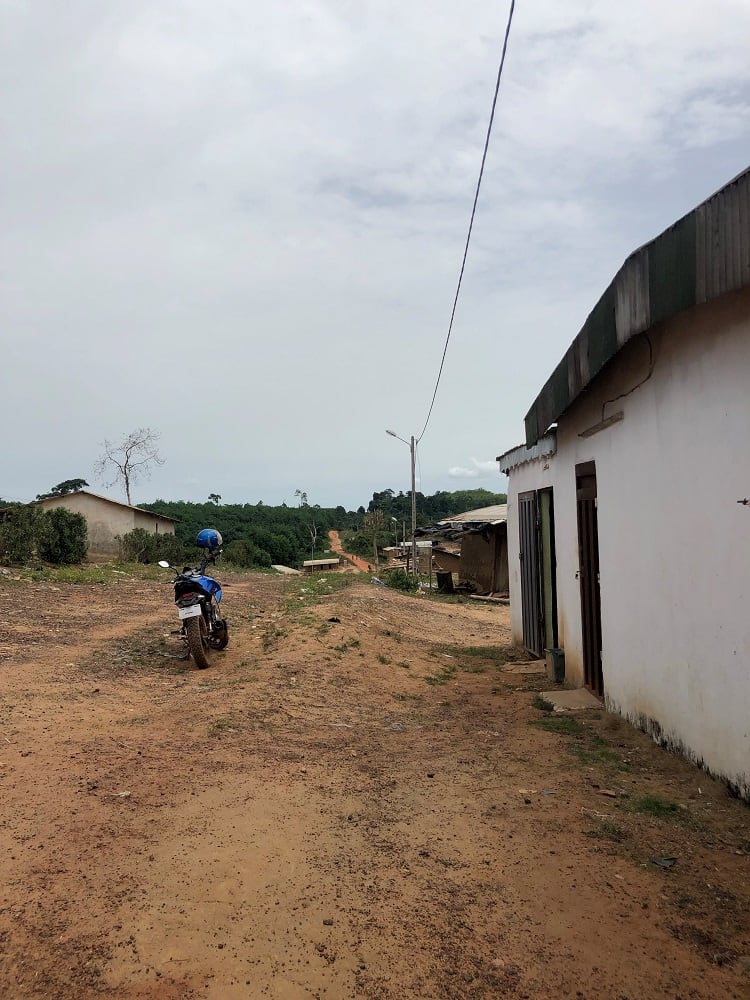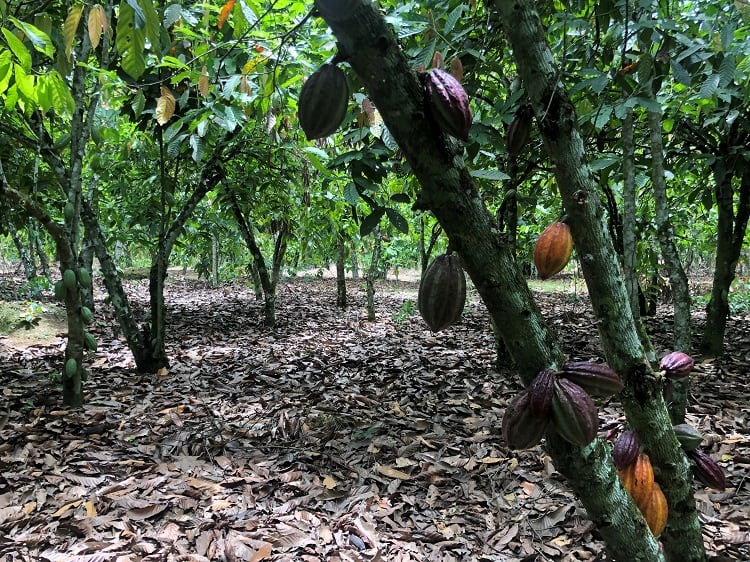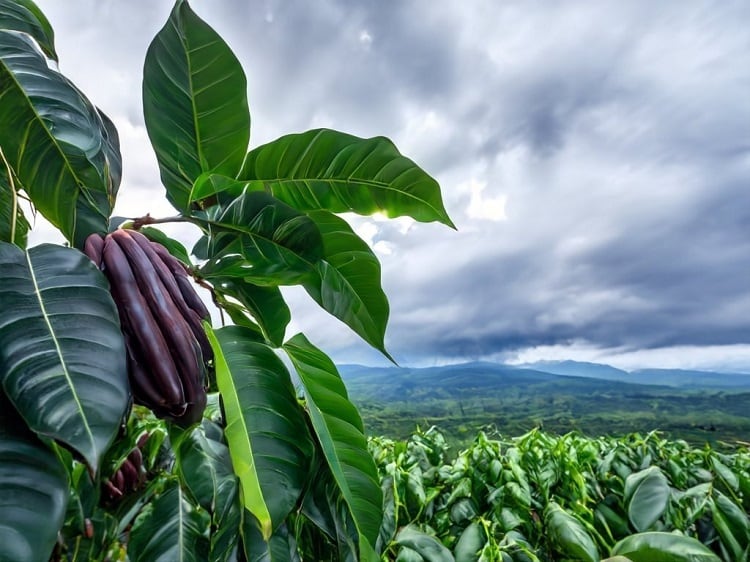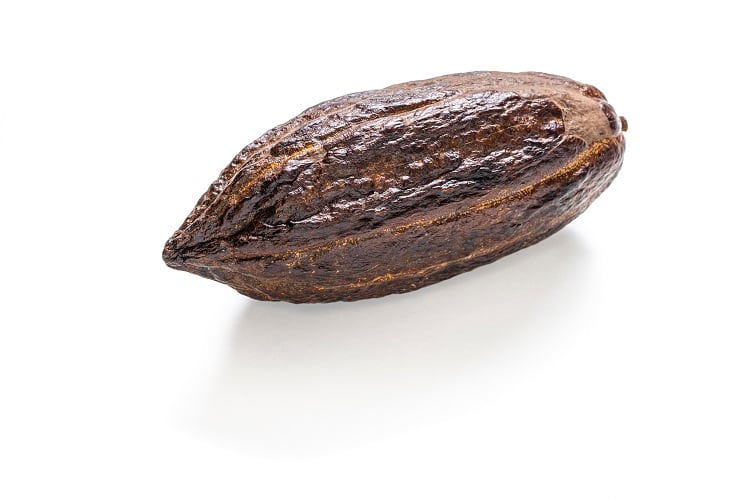The cocoa cooperative system in Côte d'Ivoire works as a conduit for farmers. Instead of each farmer negotiating directly with a buyer, cooperatives use an intermediary, who represents the farmers in the cooperatives and negotiates cocoa prices for them.
They also act as a conduit through which large companies can organise training in agricultural practices, such as new methods like pruning.
Cocoa cooperatives tend to work closely with ingredients companies such as Olam Food Ingredients (OFI) to sell their produce, and organisations such as Rainforest Alliance (RA) to acquire the right certification to operate.
Origin of the cooperatives
Cooperatives in Côte d’Ivoire started off small. “In Côte d’Ivoire, the first denomination of what we call today a société coopérative was a 'cooperative purpose-driven grouping' (in French, GVC) - the first step toward a co-op. This small farmer organisation was put in place as cocoa production was growing in Côte d’Ivoire, to help cocoa farmers combine their efforts by pooling together their produce for sale,” Nanga Kone, Côte d’Ivoire country director for RA, told FoodNavigator.
“This helped increase their bargaining power and share the sales revenue pro-rated. Later on, as a result of governmental decisions, the GVC developed into co-ops which are bigger organisations than GVCs but with similar purpose and objectives.”
Cocoa price crisis
Cocoa has risen in price by 400% in a year, with the commodity trading at $10,000 (€9,311) per ton.
According to OFI's Sika, this is, in part, down to changes in the weather. “The entire cocoa industry is facing significantly high cocoa prices due to a crop shortfall in major cocoa-growing countries like Ghana and Cote d’Ivoire. This has been driven by a combination of factors, including unfavourable weather patterns,” she told us.
Another factor could be the Swollen Shoot Virus (SSV), which is spread by insects and affects cocoa crops, or lower subsidies for fertilizer use.
When Côte d’Ivoire’s commercialisation system was first developed, according to Flora Coffi Sika, OFI's head of sustainability for Africa, the law stipulated that farmers could not sell their wares directly, but must sell them only through cooperatives or buyers. Out of these two options, she suggested, cooperatives are the most beneficial to farmers.
“The fact that companies like us came with programmes like Rainforest Alliance (RA) certification also pushed farmers to be part of a co-op instead of selling their product to the merchant walking by, because if they are part of a co-op, they can benefit from all these programmes.”
The benefit of being part of a co-op, Sika told us, is the same benefit one would have from membership of a cooperative anywhere in the world. “You have the power of association. Farmers don't register as any company, like say a PLC. They specifically register as a cooperative. And the rules behind it are worldwide, pushing the power of association.”
How a cooperative works
The Coani cooperative, a branch of which is based in Gagny in southwestern Côte d’Ivoire, works with OFI, which operates in the region. The co-op was created in 2013 with a mere 124 members, and now has 484, included a board with seven members. It has been certified by RA (see below), and also works with the International Cocoa Initiative (ICI).

The cooperative has its farms polygon-mapped, in order to ensure that cocoa coming from said cooperative is traceable. This works to ensure that OFI can comply with the European Union Deforestation Regulation (EUDR), the deadline of the implementation of which is on 30 December 2024.
The co-op appoints a lead farmer and a group administrator, which are trained by OFI, to do the polygon mapping.
Cooperatives also receive a premium upon certification from RA, which OFI ensures is partially used for community action. It is also used, in part, to buy the tools necessary for good farming practices.
“We know many of the group practices we need to do, but we may not have the means to do them,” said Kanga Konan Davis, Coani Cooperative lead and trainer for Gagny village. “The training that OFI brings to us, the tools, here comes through the premium, or even sometimes on top of the premium.”
OFI also works with the Coani co-op to reduce child labour and forced labour, which includes regular checks looking for instances where it is happening.
Certifying a cooperative
The Coani cooperative is Rainforest Alliance-certified, providing assurance to OFI that it meets certain standards. “To be certified, farms and farm groups must comply with requirements that set out good practices with respect to environmental, economic and social well-being. Our standard helps farms and farm groups (including cocoa cooperatives) identify and fulfil the requirements that are most relevant to their local context,” RA's Kone told us.
“Independent, third-party auditors – critical to the integrity of any certification programme - evaluate farms and farm groups against requirements before granting or renewing certification. The audit primarily checks to see if the required systems, controls, and incentives are in place to ensure that sustainability requirements are followed all year round.
“Auditors use a variety of methods. These include interviews with farm management, workers, and individual producers as well as various document checks and physical site inspections. We also have review processes and shadow audits to maintain quality. Our assurance process goes beyond just on-site visits; it also includes remote risk assessments, detailed documentation reviews, consultations with stakeholders, and careful data analysis.”
Chocolate scorecard dissapoints
A recent edition of the Chocolate Scorecard, coordinated by civil society coalition Be Slavery Free, judged that the chocolate industry is failing to meet its own standards in many areas. Despite some individual successes, it found that while most cocoa companies believe that ‘a living income is a human right’ fewer than a dozen actually provide one to their workers. Pesticide use also remains high, which can impact the health of farmers.
In order to be a member of an RA-certified cooperative, each individual farmer must be certified. “For them to have an RA certification, for a co-op to have all its farmers certified with the RA each farmer must have a farm registered, so they must be registered in the system,” Coani's Denis told us. In short, a certification requires every farmer is certified.
“Once we have everybody registered, once we have the co-op registered, once we have checked they are doing things properly,” then OFI will work with them, Sika added. “Each farmer, you make sure they are trained.”
OFI, Sika told us, also collaborates with the farmers in the lead up to the RA certification process, in order to help them get certified.





